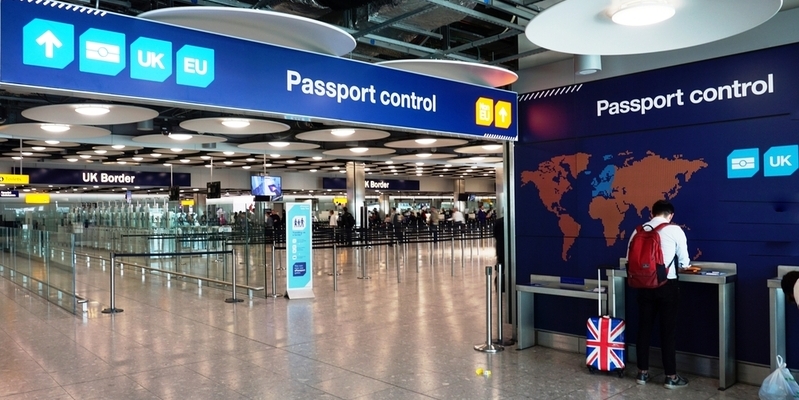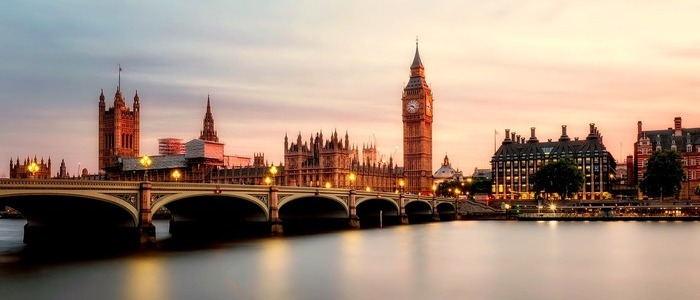
Table of Contents
▼
Table of Contents
▼Border controls are crucial for maintaining a country’s security, managing immigration, and ensuring public safety.
For travellers to the UK, understanding these controls is key to ensuring a smooth and hassle-free entry.
Here, our experts explain the UK border control processes, providing essential tips and information to help make your arrival as seamless as possible.
What is passport control?
Passport control refers to the process at UK entry points where travellers' passports and other documents are checked by immigration officers.
Passport control checks ensure that everyone who arrives at the UK border meets all necessary entry requirements.
What is checked at UK passport control?
It’s important to be aware of what is checked at passport control in the UK to avoid any issues with the UK Border Force. Make sure you have all the required documents before you travel.
Passports
All travellers must have a valid passport to enter the UK. The passport should be valid for the entire duration of your stay.
While there’s no strict minimum validity period required beyond the length of your visit, it’s generally recommended to have at least 6 months validity remaining to avoid any potential issues.
Visas
It’s essential to find out if you need a visa when travelling to the UK. If you do, you’ll have to present this at passport control.
Visa requirements for entering the UK vary depending on your nationality. Citizens of Australia, Canada, the European Union, the United States and certain other countries do not need a visa for stays of up to 6 months.
However, if your country is not on the visa-exempt list, you’ll need to apply for a visa before travelling.
The type of visa you need depends on the purpose of your visit. Study visas, work visas and visitor visas are some of the most common types.
Electronic Travel Authorisation
The Electronic Travel Authorisation (ETA) is a new entry requirement for certain nationalities. The ETA allows for 6 months of visa-free travel to the UK.
It’s currently only available for citizens of the Gulf Cooperation Council countries:
- Bahrain
- Kuwait
- Oman
- Qatar
- Saudi Arabia
- United Arab Emirates
However, the UK will require citizens from all visa-exempt countries to apply for the ETA by 2025.
You can apply for the ETA UK online before you travel. UK Visa Kingdom offers a simplified online application process, with expert advice and error-checking.
Once you have an ETA, you can enter the UK as many times as you like during a 2-year period. However, the ETA does not guarantee entry. You’ll still need to speak to a UK Border Force officer upon arrival.
Arrival procedures in the UK
Knowing what to expect upon arrival in the UK can help make sure you enter the country without issue. Here’s an overview of the arrival procedures, major ports of entry, and border control checks.
UK ports of entry
The UK has several major ports of entry, including airports, ferry terminals, and Eurostar stations.
Key airports include:
- London Heathrow
- London Gatwick
- Manchester
- Edinburgh
Popular ferry terminals are Dover, Portsmouth, and Harwich, while the Eurostar train connects London St Pancras International with various European cities.
Going through UK passport control
Upon arrival at any of these ports, you must go through passport control. Nowadays, certain nationalities are eligible to use eGates. Other travellers will have to go through the staffed passport control desks.
Using an eGate
Automated ePassport gates are available at many major airports for travellers with biometric passports from the UK, EU, EEA, and certain countries. eGates can speed up the passport control process. This is what to expect:
- 1- Approach the eGate and scan your passport’s photo page.
- 2- Look at the camera for a facial recognition check.
- 3- Once your identity is verified, the gates will open, allowing you to proceed.
Passport control desk
If you’re not eligible for the ePassport gates, you’ll proceed to a staffed passport control desk.
During the passport check, an immigration officer will verify your passport and any required visas or travel authorisations.
You can expect to be asked several questions. These questions can include the purpose and duration of your visit, where you will be staying, and how you plan to support yourself financially during your visit.
Be prepared to show any supporting documents, such as hotel reservations, return tickets, or proof of sufficient funds.
Understanding these procedures and having your documents ready will help ensure you go through passport control quickly. Once cleared, the officer will stamp your passport and allow you to proceed.
What items do I need to declare at UK customs?
When entering the UK, you may need to declare certain items at customs. Here's a quick overview of what you need to declare:
- Cash: Amounts of €10,000 or more (or equivalent in other currencies) if arriving from outside the EU.
- Alcohol and tobacco: Quantities exceeding personal allowance limits.
- Goods: Any goods exceeding your duty-free allowance.
- Prohibited and restricted items: Certain foods, plants, and animal products, as well as weapons and drugs.
- Commercial goods: Items intended for sale or use in a business.
Ensure you’re aware of these requirements to avoid any issues at customs.
Duty-free allowances when entering the UK
When entering the UK, you’re allowed to bring in certain goods without paying duty or tax, up to specific limits.
Alcohol
The limit of alcohol you may bring into the UK duty-free is:
- 42 litres of beer
- 18 litres of wine (excluding sparkling wine)
- 4 litres of spirits or strong liqueurs (over 22% alcohol)
- 9 litres of sparkling wine, fortified wine, or other liqueurs (up to 22% alcohol)
Tobacco
The following amount of tobacco products are permitted duty-free:
- 200 cigarettes
- 100 cigarillos
- 50 cigars
- 250 grams of tobacco
Other goods
Up to £390 worth of other goods, including gifts and souvenirs, or up to £270 if arriving by private plane or boat.
These allowances apply if you are arriving from outside the European Union (EU). Different rules may apply for EU arrivals, depending on the status of post-Brexit agreements.
Travelling to the UK with pets
If you want to bring pets into the UK, you must comply with their specific entry requirements. These rules ensure the safety and health of animals and people. Some rules to be aware of include:
- Pet passports: Pets must have a valid pet passport or third-country official veterinary certificate.
- Microchipping: All pets must be microchipped.
- Vaccinations: Pets need to be vaccinated against rabies, with the vaccine administered at least 21 days before travel.
- Tapeworm treatment: Dogs must be treated for tapeworm 24 to 120 hours before entry into the UK.
- Approved routes: Pets must travel via approved routes and carriers.
By understanding and adhering to these customs regulations, you can ensure your pets are able to enter the UK without issue.
UK border control tips
Navigating border control can be stress-free with the right preparation. Here are some quick tips to help you pass through efficiently.
Preparation tips
You can take some of the stress out of passing through border control by ensuring you’re fully prepared. Make sure to:
- Organise documents: Keep your passport, visa (if required), and supporting documents (like hotel reservations or return tickets) easily accessible.
- Complete forms in advance: Fill out any required arrival forms before landing.
- Travel light: Minimise carry-on baggage to move quickly through the airport.
- Know your route: Familiarise yourself with the layout of your arrival airport and the location of customs and immigration.
Peak travel times
Plan your travel to avoid peak times like holidays and weekends. Early mornings and late evenings are often less crowded.
If you must travel during busy periods, arrive at the airport earlier to accommodate longer wait times. Check for travel advisories or updates, especially during peak seasons.
Useful apps and resources
There are a number of apps and online resource that you can use to make your trip stress-free:
- UK Border Force app: Provides real-time queue information at UK airports.
- Gov.uk website: For the latest entry requirements, customs regulations, and travel updates.
- Airline apps: Mobile boarding passes and real-time flight updates can streamline your journey.
- Travel apps: Apps like TripIt or Google Trips organise your itinerary and keep essential information in one place.
Passing through UK border control with children
When travelling with children, make sure each child has a valid passport and any necessary visas. If only one parent or guardian is travelling, carry consent letters.
Advice for business travellers
For business travellers entering the UK, it's crucial to have all necessary documents ready, including invitation letters and conference details.
Ensure you possess the correct visa or work permit for conducting your intended business activities in the UK, and have them ready to show at border control.


